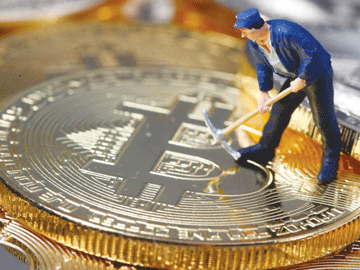Goa is abuzz with excitement as vintage bike and car owners, users, collectors and fans are decking […]

CRYPTO ACCEPTED BUT 30 % TAX! BY ARVIND PINTO
Feb 12- Feb 18 2022, Finance February 11, 2022DISCOURAGED: Fans of crypto currency are not enthusiastic about its promotion by the FM because of the high 30% tax imposed on it. 30% is the highest level of taxation in the country.
By Arvind Pinto
Finance Minister Nirmala Sitharaman has conferred legal status on crypto currency. Unlike the normal currency, crypto is an international financial unit, produced through blockchaim technology. Crypto currencies can be traded like shares in the stock market.
IN the lackluster budget that Finance Minister Nirmala Seetharaman placed before the nation on February 1, 2022 one of the few futuristic concepts was her announcement that “the government has proposed to issue a Digital Rupee, or Central Bank Digital Currency (CBDC), in the fiscal year 2022-23. Additionally, the budget also proposed imposing a tax of 30% on virtual assets, effectively legitimizing trading of private crypto currencies and non-fundable tokens. This is broadly in line with the Centre’s plans to have a fiat digital currency, while disallowing use of private virtual coins as legal tender.”
This was probably one of the first official announcements indicating that the country is moving into a digital currency mode. To most of us who have lived our life with bank notes and coins as a medium of exchange, to buy things or to receive our monthly salary, this idea of a digital rupee sounds rather strange. True, today many of us have slowly moved into debit and credit cards as methods of payment and a few adventurous have even moved to Google Pay or Paytm, without really understanding how it really works!
A digital rupee? How would this work, or whether it will work in India? Let’s have a look! At first, we need to understand the concept and the processes that make this possible.
PHYSICAL CURRENCY
WITH the growth of the digital space, there have been attempts by several individuals and even sovereign states to do away with physical currency and create digital money. As the motto on the US dollar, “In God We Trust,” all currency issued requires trust. For the intrinsic value of either a coin or a paper note is insignificant compared with the value that people place in it. Thus, the decisive factor that inhibits the issue of digital currency is the fear that the creators of digital currency or crypto currency may appropriate part of this currency to themselves. In order to allay this fear, bitcoin or digital currency uses a specific database called a blockchain.
Normal databases have an owner, a person who can change or modify entries. Blockchain is different, because nobody is in charge. It is run by people who use it. Blockchain is a system of recording information in a way that makes it difficult or impossible to change, hack or cheat the system. For a blockchain is essentially a digital ledger of transactions. In this blockchain that operates without a central authority, individual transactions have to be authenticated. This is done by each of the users having a crypto key (like a password) that identifies a user while giving access to their ‘’account’’ or ‘’wallet’’ of value on the system. Each user has a double set of keys – a private key that gives them access to their own data, as well as a public key that is accessible to every other user in the system. The private key allows the user to enter and perform a transaction — say to transfer units to other users in the chain.
Once a transaction is agreed upon between users, it needs to be approved or authorized by a domain of users before it is added to the chain.
TRADING PLATFORMS
THE units of a block chain, bit coin, are available in India. To buy bit coins, one has to register with some of the known trading platforms. There are several in India, such as Coinbase, Binance, eToro or ZebPay. Each of these exchanges have their own registration and identification processes that are to be complied with before one can buy or sell on trade in bitcoins.
What are the governmental regulations in crypto possession and trading? In the year 2013, the Reserve Bank of India issued a press release advising people against buying or selling bitcoins or other such crypto currencies. The reason given was that crypto currency is not back by any financial institution or any tangible asset. In 2017, the Central government formed an inter-ministerial committee to study the various issues relating to the buying and selling of bitcoins. The Committee suggested that a bill be proposed banning crypto currency while suggesting the creating of a digital rupee.
This latter suggestion has now been suggested in the Finance Bill 2022. In 2018, the Reserve Bank of India, issued a circular banning crypto currency. The result was that banks would not provide service to these crypto currency exchanges. In a landmark judgment, the Supreme Court held that the ban imposed by the RBI was unconstitutional. The ruling of the Supreme Court held that Indian companies had freedom to trade and practice any profession and this ban by the RBI was an infringement of a tenet of the fundamental rights.
Since then, several crypto exchanges continue to flourish in India. In the Finance Bill 2022, the profits from these transactions are brought to tax. Thus, government has acknowledged that crypto currency exists in India and there is trading going on in these virtual currencies and it has therefore decided to tax the profits made by these transactions.
SIX OR SEVEN EXCHANGES
SEVERAL companies as also individuals and firms continue to show crypto currencies as assets in their balance sheet. There are around six or seven crypto exchanges in India. The total volume of crypto currency is less than 100 crore, small enough but substantial since India is not a big player in the crypto market. The current price of Bitcoin (BTC) is around Rs34,58,200 while other currencies such as Ethereum (ETC) are Rs2,45,528 while Tether (USDT) are Rs79.64. There are several but these are some of the larger players in the market. Trading in these bit coins is on a 24-hour basis and the volumes rise or fall according to supply and demand.
SHOULD I dabble in crypto currencies? As of today, crypto currencies and exchanges continue to operate in India. The Supreme Court in its 2018 order has set aside the RBI ban on their operation. Should one hold or trade in crypto currency? Like the stock market, these exchanges work on the notion of supply and demand. Unless one has adequate knowledge of these market, it would be good if we study the process and the bit coin domain before venturing into this asset class.
However, crypto currency is an asset of the future. Neither would government be in a position to ban either its buying, selling or trading. For those who have an appetite for taking risks to arrive at new horizons, crypto currency is the medium for the future. There are profits or losses to be for those who have a risk appetite for these virtual instruments!















